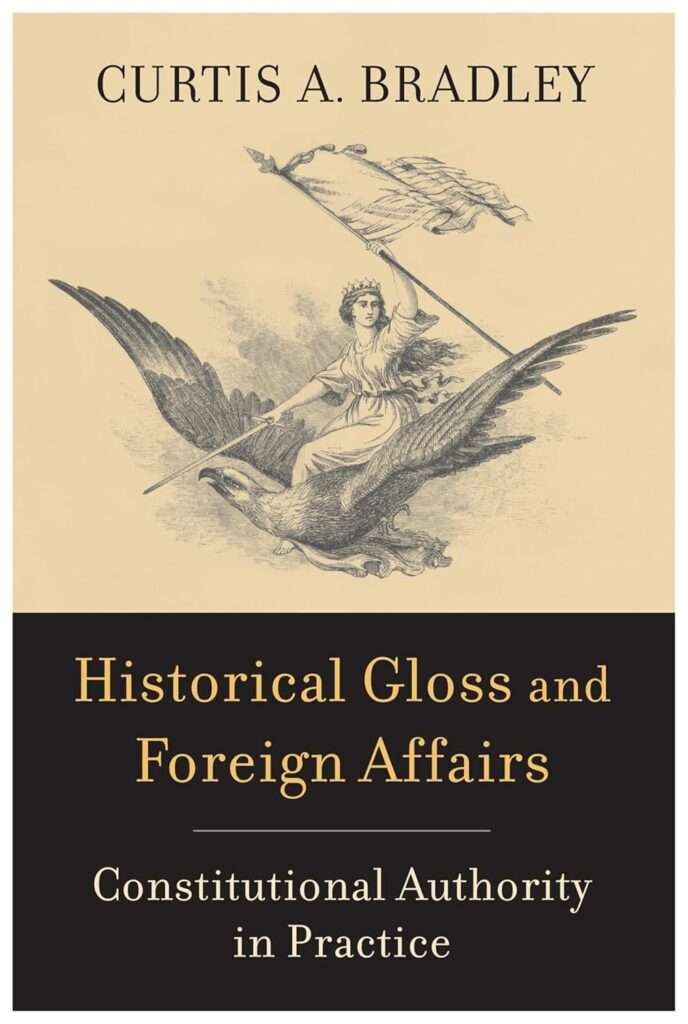
I'm delighted to report that Prof. Curtis A. Bradley (Chicago) will be guest-blogging this coming week about his new book; here's the publisher's summary of the book:
A new interpretation of the constitutional law of foreign affairs, as it has been developed throughout its history by presidents and by Congress.
In the more than 230 years since the Constitution took effect, the constitutional law governing the conduct of foreign affairs has evolved significantly. But that evolution did not come through formal amendments or Supreme Court rulings. Rather, the law has been defined by the practices of Congress and the executive branch, also known as "historical gloss."
Curtis A. Bradley documents this process in action. He shows that expansions in presidential power over foreign affairs have often been justified by reference to historical gloss, but that Congress has not merely stepped aside. Belying conventional accounts of the "imperial presidency" in foreign affairs, Congress has also benefited from gloss, claiming powers for itself in the international arena not clearly addressed in the constitutional text and disrupting claims of exclusive presidential authority.
Historical Gloss and Foreign Affairs proposes a constitutional theory that can make sense of these legal changes. In contrast, originalist theories of constitutional interpretation often ignore influential post-Founding developments, while nonoriginalist theories tend to focus on judicial decisions rather than the actions and reasoning of Congress and the executive branch. Moreover, the constitutional theories that do focus on practice have typically emphasized changes at particular moments in time.
What we see in the constitutional law of foreign affairs, however, is the long-term accumulation of nonjudicial precedents that is characteristic of historical gloss. With gloss confirmed as a prime mover in the development of foreign affairs law, we can begin to recognize its broader status as an important and longstanding form of constitutional reasoning.
And the jacket blurbs:
"An instant classic. As the foremost scholar in the country on the Constitution and foreign affairs, Curt Bradley has written the single best book on the subject. Historical Gloss and Foreign Affairs is a must-read for anyone interested in understanding how constitutional law develops, and it could not be timelier."―Michael Gerhardt, University of North Carolina School of Law
"Outstanding. With acuity and nuance, Curt Bradley explains how presidents have come to be so mighty and how Congress can check them when it wishes. What a splendid book!"―Jean Galbraith, University of Pennsylvania Carey Law School
"Historical Gloss and Foreign Affairs is the definitive account of the unique ways that historical practice informs the allocation of constitutional power in foreign affairs, where constitutional text is very often a poor guide to legitimate practice. Its powerful explanation of how historical gloss informs constitutional meaning is also a vital contribution to constitutional theory more generally."―Jack Goldsmith, Harvard Law School
"One of the finest books about the foreign relations law of the United States ever written. Bradley provides a masterful analysis of all the important topics and makes a convincing case about the role of historical gloss in shaping doctrine."―Paul Stephan, University of Virginia School of Law
"An incisive guide to how the Constitution has accommodated dramatic shifts in the conduct of foreign affairs throughout its history―and how it might continue to do so going forward."―Monica Hakimi, Columbia Law School
The post Curtis Bradley Guest-Blogging About "Historical Gloss and Foreign Affairs: Constitutional Authority in Practice" appeared first on Reason.com.







